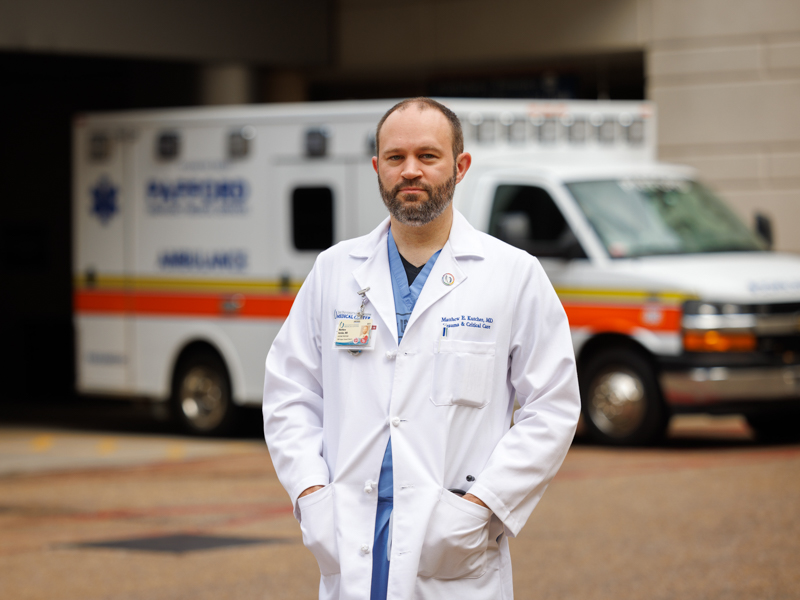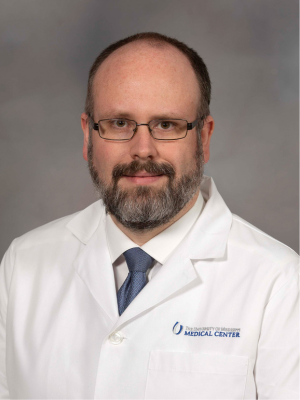Trauma drug study aims to save lives following severe injuries

Of the more than 100,000 patients who receive acute care in the Adult Emergency Department at the University of Mississippi Medical Center each year, Dr. Matthew Kutcher remembers one case specifically, taking care of a patient in an accident involving heavy machinery at work.
“There was an injury to the major artery supplying blood to one of his legs,” said Kutcher, an associate professor of surgery and emergency medicine who treats critically ill and injured patients in UMMC’s Emergency Department and intensive care units. “Thankfully, he was taken to a nearby local hospital quickly, where he received life-saving early blood transfusions.”
The patient was transferred to UMMC for surgery but had lost a lot of blood.

“By the time he arrived at UMMC, he had lost more than two liters of blood and received several red blood cell and plasma transfusions,” said Dr. Joe Doherty, an assistant professor of emergency medicine who treated the patient in the Emergency Department. “And although the blood he lost had been replaced by transfusions, his blood wasn’t clotting normally, and he was still bleeding.”
As the patient was being rushed to the operating room, Kutcher and Doherty gave two medicines to help his blood get back to clotting normally – calcium and vasopressin. “Calcium is an important part of the chemical reactions involved in blood clotting, but calcium levels are also lowered during the process of transfusion. So, if we don’t fix low calcium levels we can replace blood that is lost but patients often continue to bleed,” Kutcher said.
Vasopressin also helps platelets work better, which can help blood clots form more quickly, Doherty said.
“This can both help stop bleeding and also reduce the need for blood transfusions,” he said.
The CAlcium and VAsopressin following Injury Early Resuscitation Trial, CAVALIER for short, will be conducted at 15 trauma centers across the country, including UMMC. The study aims to enroll 1,050 people aged 18 to 90. Patients who have traumatic injuries with loss of blood may be enrolled by participating emergency medical personnel during their transportation to the hospital, or after arrival to UMMC.
“What we’d like to learn from this study is whether giving these life-saving medications sooner after injury can help more patients survive,” said Kutcher, co-investigator of the UMMC study site.
CAVALIER is an Exception from Informed Consent trial, or EFIC, meaning the trial requires performing a potentially life-saving intervention in people who are too injured to give permission. This study will look at treatment for patients who have a traumatic injury and have lost a lot of blood. Also, those performing the study might need to forego the traditional step of asking the patient on the front end if they’d like to participate in the trial and giving them documents to sign and time to make a thoughtful decision. When a patient is bleeding profusely and their injuries make it impossible for them to give consent, or when their family is absent or cannot immediately be found, life-saving treatment cannot wait. Permission for continued participation will be obtained from patients once they are able, or from their family members, as soon as possible.
UMMC is the state’s sole Level I Trauma Center and was chosen for the study because of its experience in trauma care, and specifically its ability to manage severe bleeding. The Medical Center is one of 29 members of the Department of Defense-funded LITES research network, which stands for Linking Investigations in Trauma and Emergency Services, that focuses on blood, breathing and brain research.
Community meetings and visits with small and large hospitals for feedback will be planned as the year goes on, with the trial at UMMC expected to be activated by fall.
For more information about CAVALIER or to complete an anonymous survey on your thoughts about this EFIC study, please go to www.litesnetwork.org/CAVALIER.


